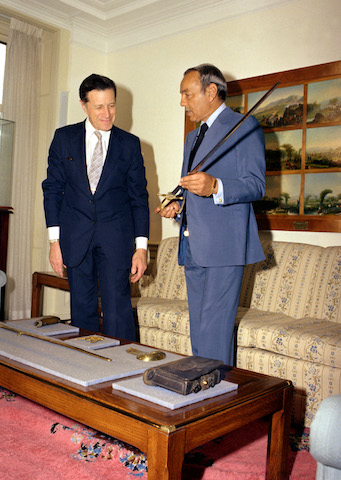Updated
King Hassan II Abrogated a Treaty with Libya in 1986: The United States was “Delighted” – Ambassador Edward M. Gabriel (ret.)

Secretary of Defense Caspar W. Weinberger meets with King Hassan of Morocco, who presents a gift to the Secretary in his office in the Pentagon, Room 3E880. Photo: Frank Hall via Wikimedia Commons
Ambassador Edward M. Gabriel (ret.)
January 18, 2018
 A recently discovered letter, dated September 1986, from Secretary of Defense Casper Weinberger to King Hassan II, revealed an end to a two-year split between the United States and Morocco over a Libya-Morocco detente, and underscored the importance of reestablishing our close and respectful bilateral relationship during the presidency of Ronald Reagan.
A recently discovered letter, dated September 1986, from Secretary of Defense Casper Weinberger to King Hassan II, revealed an end to a two-year split between the United States and Morocco over a Libya-Morocco detente, and underscored the importance of reestablishing our close and respectful bilateral relationship during the presidency of Ronald Reagan.
Weinberger’s letter notes his pleasure with King Hassan’s decision to abrogate Morocco’s Arab African Federation Treaty with Libya, stating, “I was extremely pleased and delighted to hear of Your Majesty’s action… while vacationing with my family… it made my holiday that much more enjoyable.”
In a controversial disinformation operation launched by the United States against Libya in the early 1980’s, President Reagan ordered a campaign to isolate and destroy Libyan President Ghaddafi and Libya’s ability to continue what it viewed as terrorist activities, and expected that Morocco would play an important part in that effort.
So, one can imagine why the United States was “startled” when, on August 14, 1984, in the middle of its campaign to destroy Ghaddafi, King Hassan and the Libyan President signed the Arab African Federation Treaty, with the aim of creating a “Great Arab Maghreb”. At the time, the Reagan Administration viewed Morocco as a “bulwark against Libyan subversion and expansionism in Africa,” and therefore saw this as unhelpful, lending legitimacy to Ghaddafi, and potentially setting back the US-Morocco relationship.
For the Reagan Administration, Ghaddafi’s terrorist actions reached their height when he ordered the bombing of a West Berlin discotheque in 1986. In retaliation, the US, in an operation code-named Operation El Dorado Canyon, bombed Libya in April of that year.
In August of that same year, recognizing that Ghaddafi had become an international pariah, King Hassan ended the Libyan relationship and eliminated a problem that had caused much consternation to the US. This action by the King was of no small consequence to the US, given its foreign policy priorities at the time.
One can understand the seriousness of the Libyan issue to the United States, and consequently the importance of King Hassan’s abrogation of the Libyan treaty, when years later Weinberger compared the Libyan affair to America’s worst terrorist event on 9/11/2001. He said, “I was reminded of… when the Libyans sponsored the bombing of the Berlin discotheque and killed American servicemen, injuring many others in Berlin… we put a 200-plane raid in the air and destroyed many Libyan targets connected with this terrorist act, and drove Qaddafi underground, so that nothing was heard from him effectively for two or three years… That’s essentially what I hope we can do this time.”
Secretary Weinberger’s letter was thus important in that it expressed satisfaction with King Hassan’s decision. He wrote, “As Your Majesty knows, US relations with Colonel Ghaddafi reached ‘the threshold of the intolerable’ long ago because of his support for international terrorism and his efforts to undermine Middle East peace. It is unfortunate that Your Majesty’s determined efforts, like those of many others, to induce him to become a respectable member of the international community, continue to fail.”
Weinberger went on to say, “I have long regarded the friendship that historically has bound our two governments, and in particular our two military establishments, as both important and enduring. I believe we are approaching an historic period in the Middle East when the efforts of strong leaders like Your Majesty will be pivotal in our pursuit of lasting solutions to the critical problems that confront us in the region. I am confident that our relationship …can be restored fully…I once again salute your fortitude and your wisdom….”
King Hassan’s decision did not come without it costs, as Ghaddafi would attempt to have him killed in 1987. However, from 1986 forward, the US- Moroccan relationship would only continue to grow stronger, through the GHW Bush, Clinton, and W. Bush administrations.